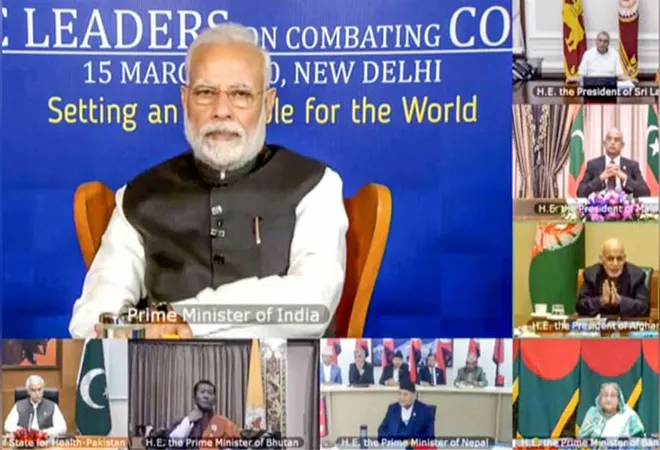
Reacting to the rising tension between India and Pakistan following the Pulwama terror attack, Nepal, the current chair of South Asian Association for Regional Cooperation (SAARC) has urged India and Pakistan to exercise restraint. This statement assumes significance in the backdrop of the inconsequential role played by the South Asian regional organisation in conflict resolution and peace building in the region.
The eight-member South Asian organisation is the only important regional institution where both India and Pakistan are members.
Largely viewed as a ‘failure’ in promoting regional cooperation, the inability to make progress is, in turn, attributed to the unending hostility between India and Pakistan.
India-Pakistan conflict has long defined the boundary of South Asia’s security dynamics. Far from playing a role in interstate conflict, the regional organisation has stayed away from crisis in fellow member states. Moreover, the SAARC Charter bars discussion on contentious bilateral issues.
Within this context, the regional bloc may not be able to play any meaningful role in the current crisis between India and Pakistan. However, Nepal’s statement raises the question of how regional countries view the developments following the Pulwama terror attack. Furthermore, can SAARC envision itself as a provider of regional public goods in promoting peace and security?
The SAARC nations were among the first to condemn the Pulwama terror attack. Nepal’s Prime Minister K.P. Sharma Oli called Prime Minister Narendra Modi to condemn the terrorist attack as Nepal’s foreign office in a statement “strongly” condemned the “heinous act.”
Sri Lankan Prime Minister Ranil Wikremesinghe in a Twitter post “strongly condemn” the brutal terrorist attack. In a letter to External Affairs Minister Sushma Swaraj, the Maldivian foreign minister Abdulla Shahid conveyed his country’s commitment “to fight against terrorism” and “to work closely with India, and the international community in eliminating this global menace.”
Bhutan’s foreign minister in a statement posted on Twitter “strongly condemn” the attack and expressed solidarity with the government of India.” Bangladesh Prime Minister Sheikh Hasina extended support to India to fight terror jointly after the Pulwama attack. Afghanistan “strongly” condemned the terrorist attack and stressed the need for “closer cooperation of countries in the fight against this common enemy.”
As tension increased between India and Pakistan after the downing of a fighter jet each following the Pulwama attack, concerns shifted to regional peace and stability.
“As the current Chair of SAARC, Nepal… calls on (India and Pakistan) to exercise utmost restraint and not engage in actions that would threaten peace and security in the region,” Nepal’s ministry of foreign affairs said in a statement. The statement further urged both sides to “seek solution through dialogue and peaceful means in order to ease tension and normalize the situation” and stressed “the importance of peace and stability in South Asia.”
Other SAARC nations echoed Nepal’s concerns. Sri Lankan’s foreign office in a statement “strongly supports peace and stability in the South Asia region” and urged India and Pakistan to diffuse tensions through dialogue to ensure peace and stability of the entire region. Similarly, the Maldives urged India and Pakistan “to exercise utmost restraint, and to preserve the stability, peace and security in the region” and stressed the need for speedy resolution through diplomacy and dialogue.
There is a strong regional dimension in these statements emphasising the implications of India-Pakistan conflict on the entire South Asian region and stressing the need for peaceful solution through dialogue and diplomacy.
Although the Sri Lankan statement mentions India and Pakistan, the other two statements were not explicit. In a way implying the need for parties in conflict to consider regional voices, if not the existence of a space for a regional role in the crisis.
There has not been any proposal for the regional organisation to play a role in the current crisis between India and Pakistan. This is understandable, particularly when the parties in conflict are the two biggest and most powerful members of the organisation.
Nevertheless, an issue where SAARC as a regional organisation could have taken a more proactive stance is in countering terrorism. As noted above, all the SAARC members have vehemently condemned the Pulwama attack. Nepal did it in its national capacity, but not as chair of SAARC, as it did in the implications of the conflict on regional peace and stability.
A statement condemning the attack from the SAARC chair would have sent out a strong message about the regional body’s stance on extremism and terrorism.
Such a move would also be in line with the regional organisation’s principled stance on terrorism as highlighted in the 18th SAARC Summit held in November 2014 when the SAARC leaders “unequivocally condemned terrorism and violent extremism in all its forms and manifestations” and “underlined the need for effective cooperation among the Member States to combat them.”
Furthermore, in 2016, four members of the grouping boycotted the SAARC Summit after the Uri terror attack. In the backdrop of these precedents and at a time when most of its members have expressed their willingness to work together to combat terrorism, a statement would have strengthened the SAARC Regional Convention on Suppression of Terrorism. If SAARC were to reinvent itself as a relevant actor in regional security, issues such as counter-terrorism need to form the base of regional security cooperation.
It may be too late for the SAARC’s chair to issue a statement condemning the Pulwama terror attack. In fact, such a move would create a precedent for its successors to emulate in the future. For SAARC to succeed, opportunities such as this need to be seized.
On the wider regional role on interstate conflicts that threatens regional peace and security, the inability of SAARC to play any role beyond issuing a cautionary statement tells a lot about the low level of SAARC as an actor in promoting peace and preventing conflict. There is a long way to go for SAARC to be an effective actor in regional security issues and perhaps, Nepal’s diplomatic push on India and Pakistan is a beginning.
The views expressed above belong to the author(s). ORF research and analyses now available on Telegram! Click here to access our curated content — blogs, longforms and interviews.




 PREV
PREV


